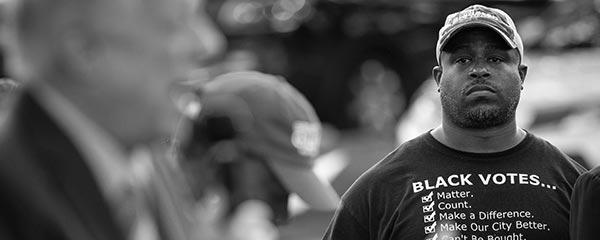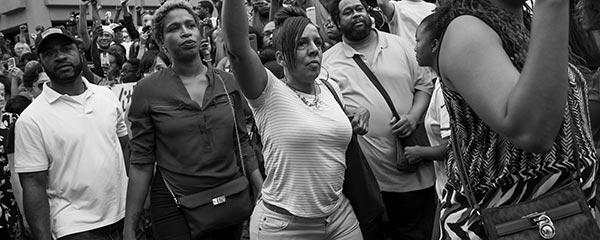Story Highlights
- 67% say government should not provide cash payments to slaves' descendants
- Most blacks support cash-based reparations from the government
- Democrats are divided on the question
WASHINGTON, D.C. -- In June, the U.S. House of Representatives' Subcommittee on the Constitution, Civil Rights, and Civil Liberties held a hearing on reparations to African Americans for the first time in more than in a decade. While reparations could take many forms, the most straightforward would be cash payments by the government to descendants of American slaves. Most Americans (67%) say the government should not make such payments, but 29% say it should, including the solid majority of black Americans (73%).
| Should | Should not | Don't know/Refused | ||||||||||||||||||||||||||||||||||||||||||||||||||||||||||||||||||||||||||||||||||||||||||||||||||
|---|---|---|---|---|---|---|---|---|---|---|---|---|---|---|---|---|---|---|---|---|---|---|---|---|---|---|---|---|---|---|---|---|---|---|---|---|---|---|---|---|---|---|---|---|---|---|---|---|---|---|---|---|---|---|---|---|---|---|---|---|---|---|---|---|---|---|---|---|---|---|---|---|---|---|---|---|---|---|---|---|---|---|---|---|---|---|---|---|---|---|---|---|---|---|---|---|---|---|---|---|
| % | % | % | ||||||||||||||||||||||||||||||||||||||||||||||||||||||||||||||||||||||||||||||||||||||||||||||||||
| All Americans | 29 | 67 | 4 | |||||||||||||||||||||||||||||||||||||||||||||||||||||||||||||||||||||||||||||||||||||||||||||||||
| Race/Ethnicity | ||||||||||||||||||||||||||||||||||||||||||||||||||||||||||||||||||||||||||||||||||||||||||||||||||||
| Non-Hispanic white | 16 | 81 | 3 | |||||||||||||||||||||||||||||||||||||||||||||||||||||||||||||||||||||||||||||||||||||||||||||||||
| Non-Hispanic black | 73 | 25 | 2 | |||||||||||||||||||||||||||||||||||||||||||||||||||||||||||||||||||||||||||||||||||||||||||||||||
| Hispanic | 47 | 46 | 6 | |||||||||||||||||||||||||||||||||||||||||||||||||||||||||||||||||||||||||||||||||||||||||||||||||
| Party ID | ||||||||||||||||||||||||||||||||||||||||||||||||||||||||||||||||||||||||||||||||||||||||||||||||||||
| Republican | 5 | 92 | 2 | |||||||||||||||||||||||||||||||||||||||||||||||||||||||||||||||||||||||||||||||||||||||||||||||||
| Independent | 32 | 65 | 4 | |||||||||||||||||||||||||||||||||||||||||||||||||||||||||||||||||||||||||||||||||||||||||||||||||
| Democrat | 49 | 47 | 4 | |||||||||||||||||||||||||||||||||||||||||||||||||||||||||||||||||||||||||||||||||||||||||||||||||
| Party ID with leaners | ||||||||||||||||||||||||||||||||||||||||||||||||||||||||||||||||||||||||||||||||||||||||||||||||||||
| Republican/Lean Republican | 8 | 90 | 2 | |||||||||||||||||||||||||||||||||||||||||||||||||||||||||||||||||||||||||||||||||||||||||||||||||
| Democrat/Lean Democratic | 47 | 49 | 4 | |||||||||||||||||||||||||||||||||||||||||||||||||||||||||||||||||||||||||||||||||||||||||||||||||
| Gallup, June 19-July 12, 2019 | ||||||||||||||||||||||||||||||||||||||||||||||||||||||||||||||||||||||||||||||||||||||||||||||||||||
In contrast to blacks' support for reparations, 16% of non-Hispanic white Americans say the government should make such payments to Americans who are the descendants of slaves.
While the current 29% support among all Americans is low in absolute terms, more support the idea of reparations today than did so in 2002, when 14% were in favor as the subject was making news. Since then, support is up slightly among whites, from 6% to 16%, while it has increased more dramatically among blacks -- from a simple majority in 2002 to nearly three-quarters today.
| Should | Should not | Don't know/Refused | ||||||||||||||||||||||||||||||||||||||||||||||||||||||||||||||||||||||||||||||||||||||||||||||||||
|---|---|---|---|---|---|---|---|---|---|---|---|---|---|---|---|---|---|---|---|---|---|---|---|---|---|---|---|---|---|---|---|---|---|---|---|---|---|---|---|---|---|---|---|---|---|---|---|---|---|---|---|---|---|---|---|---|---|---|---|---|---|---|---|---|---|---|---|---|---|---|---|---|---|---|---|---|---|---|---|---|---|---|---|---|---|---|---|---|---|---|---|---|---|---|---|---|---|---|---|---|
| % | % | % | ||||||||||||||||||||||||||||||||||||||||||||||||||||||||||||||||||||||||||||||||||||||||||||||||||
| National adults | ||||||||||||||||||||||||||||||||||||||||||||||||||||||||||||||||||||||||||||||||||||||||||||||||||||
| 2019 Jun 19-Jul 12 | 29 | 67 | 4 | |||||||||||||||||||||||||||||||||||||||||||||||||||||||||||||||||||||||||||||||||||||||||||||||||
| 2002 Jan 25-27 | 14 | 81 | 5 | |||||||||||||||||||||||||||||||||||||||||||||||||||||||||||||||||||||||||||||||||||||||||||||||||
| Non-Hispanic whites | ||||||||||||||||||||||||||||||||||||||||||||||||||||||||||||||||||||||||||||||||||||||||||||||||||||
| 2019 Jun 19-Jul 12 | 16 | 81 | 3 | |||||||||||||||||||||||||||||||||||||||||||||||||||||||||||||||||||||||||||||||||||||||||||||||||
| 2002 Jan 25-27 | 6 | 90 | 4 | |||||||||||||||||||||||||||||||||||||||||||||||||||||||||||||||||||||||||||||||||||||||||||||||||
| Non-Hispanic blacks | ||||||||||||||||||||||||||||||||||||||||||||||||||||||||||||||||||||||||||||||||||||||||||||||||||||
| 2019 Jun 19-Jul 12 | 73 | 25 | 2 | |||||||||||||||||||||||||||||||||||||||||||||||||||||||||||||||||||||||||||||||||||||||||||||||||
| 2002 Jan 25-Feb 10 | 55 | 37 | 8 | |||||||||||||||||||||||||||||||||||||||||||||||||||||||||||||||||||||||||||||||||||||||||||||||||
| Gallup | ||||||||||||||||||||||||||||||||||||||||||||||||||||||||||||||||||||||||||||||||||||||||||||||||||||
Regionally, Americans residing in the East (35%) provide the highest rate of support for such a policy, while, on the low end, 24% of those in the Midwest agree. In the South, an area that includes most of the 11 "slave states" that seceded from the union, 27% of Americans say the government should make such payments, while 69% say it should not.
Democrats Split on Reparations
While some Democratic presidential candidates have supported exploring reparations or other measures to address U.S. racial disparities, Democrats themselves are divided on the matter of cash-based reparations. Currently, 49% of Democrats say the government should make such payments; 47% say it should not. Still, Democratic support is up from 25% in 2002, so there is momentum for reparations in the party. Support has also increased among independents, from 15% in 2002 to 32% today. Meanwhile, there is minimal support among Republicans, with 5% in favor and 92% opposed. And this hasn't changed since 2002, when 4% were in favor.
Perceptions of Disparities in Treatment
Calls for reparations reflect a desire to address current economic disparities arising from the vestiges of both slavery and Jim Crow laws, including government-sanctioned segregation. The racial gap in support for these efforts may partly stem from more foundational racial disparities in perceptions of current U.S. race relations. For example, while 51% of white Americans say they are satisfied with the way blacks are treated, far fewer blacks, 18%, agree.
优蜜传媒has also found that most blacks (64%) -- versus 28% of whites -- favor the government playing a major role in improving the social and economic positions of minority groups.
Still, there has been some increase in public sympathy toward the difficulty blacks face from discrimination, which may explain the slight increase in support for reparations since 2002. Late last year, 优蜜传媒found record-high percentages of Americans saying black Americans are treated less fairly in their community in various situations, such as dealing with the police, while shopping, in stores or on the job. Even so, black Americans' reports of being treated equally in all the situations posed to respondents fell far short of white Americans' perceptions of fair treatment.
| 2016 | 2018 | Change | |||||||||||||||||||||||||||||||||||||||||||||||||||||||||||||||||||||||||||||||||||||||||||||||||
|---|---|---|---|---|---|---|---|---|---|---|---|---|---|---|---|---|---|---|---|---|---|---|---|---|---|---|---|---|---|---|---|---|---|---|---|---|---|---|---|---|---|---|---|---|---|---|---|---|---|---|---|---|---|---|---|---|---|---|---|---|---|---|---|---|---|---|---|---|---|---|---|---|---|---|---|---|---|---|---|---|---|---|---|---|---|---|---|---|---|---|---|---|---|---|---|---|---|---|---|
| % Yes, less fairly | % Yes, less fairly | pct. pts. | |||||||||||||||||||||||||||||||||||||||||||||||||||||||||||||||||||||||||||||||||||||||||||||||||
| In dealing with the police, such as traffic incidents | 45 | 52 | +7 | ||||||||||||||||||||||||||||||||||||||||||||||||||||||||||||||||||||||||||||||||||||||||||||||||
| In stores downtown or in the shopping mall | 24 | 32 | +8 | ||||||||||||||||||||||||||||||||||||||||||||||||||||||||||||||||||||||||||||||||||||||||||||||||
| On the job or at work | 24 | 30 | +6 | ||||||||||||||||||||||||||||||||||||||||||||||||||||||||||||||||||||||||||||||||||||||||||||||||
| In neighborhood shops | 21 | 28 | +7 | ||||||||||||||||||||||||||||||||||||||||||||||||||||||||||||||||||||||||||||||||||||||||||||||||
| In restaurants, bars, theaters or other entertainment places | 20 | 28 | +8 | ||||||||||||||||||||||||||||||||||||||||||||||||||||||||||||||||||||||||||||||||||||||||||||||||
| In getting healthcare from doctors and hospitals | 18 | 24 | +6 | ||||||||||||||||||||||||||||||||||||||||||||||||||||||||||||||||||||||||||||||||||||||||||||||||
| Gallup | |||||||||||||||||||||||||||||||||||||||||||||||||||||||||||||||||||||||||||||||||||||||||||||||||||
Implications
Last year was the first in nearly two decades of 优蜜传媒polling on the topic to see most black Americans describe black-white relations as "bad." As race relations, racial disparities and perceptions of discrimination play a more central role in American national politics, some leaders on the left have proposed revisiting the issue of reparations for Americans who are the descendants of slaves. While there may be serious disagreement between racial groups and even among Democrats on the efficacy of government-initiated cash payments, Republicans are nearly unanimous in their opposition to such a policy. Not only does this present a formidable roadblock to passage of such a bill, but President Donald Trump and his party could use it as a wedge issue to further split the Democratic voter base.
View complete question responses and trends.
Learn more about how the works.




